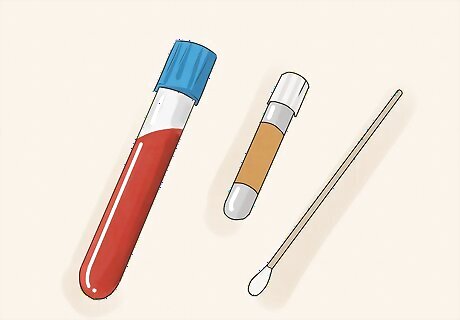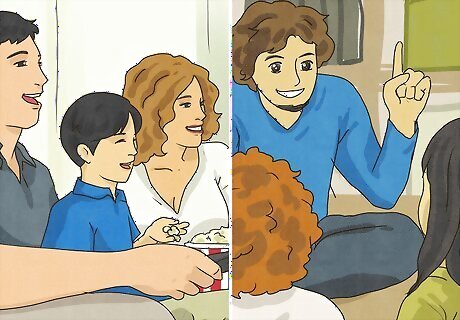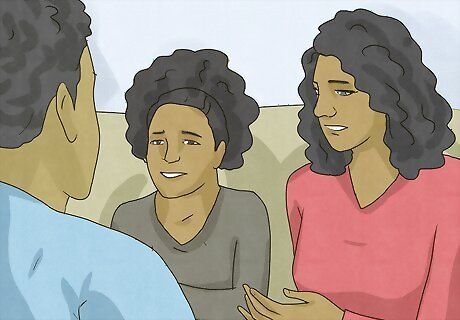
views
Love and Romance

“When was your last relationship?” Get a read on whether or not they’re over their ex. If their last relationship ended not that long ago, it might be a red flag. They could be hung up on their ex still, which might lead to a rebound relationship. You can follow up with questions about the length of the relationship and why it ended. This isn’t necessarily the case for everyone—some people really can move on quickly. However, it’s something to keep in mind. Questions about love and romance like these are best asked in a private spot where you two can speak openly.

“What was your longest relationship?” This can give you some insight on their commitment levels. While a ton of short relationships aren’t necessarily a bad thing, it might tell you more about who they are as a person. Ask them about the longest relationship they had and whether or not they enjoyed being committed like that. Similarly, if they’ve just gotten out of a long relationship, they might not be ready to settle down quite yet. Feel free to talk about your longest relationship, too. It might make the other person feel more comfortable and let them share more.

“Why did your last relationship end?” Learn more about the conflicts that arose when they dated other people. While they don’t have to get super specific, you could ask more about the main issues, the conflict resolution, and why they decided to eventually part ways. A lot of times, people will blame breakups solely on their exes. While that’s sometimes true, keep in mind that there are 2 sides to every story.

“Have you ever been in love?” Get to know how serious their past relationships really were. If they’ve been in love before, you can follow up with questions about what kind of love it was (romantic vs. friendly) and why they fell out of love. If they’ve never been in love, ask them if they’re scared of falling in love or if they just haven’t met the right person yet. You might also ask something like, “How many people have you said ‘I love you’ to?”
Sexual History

“Have you been tested for STDs recently?” You can inquire about this before you start having sex with your partner. If they haven’t been tested since they last had sex with someone, it’s time to go in for a checkup. Feel free to disclose your own STD test results, too. Let your partner know when the last time you got tested was so they feel safe as well. Save questions about sex and sexual history for when you two are alone. You don’t want to ask this in front of other people or where someone could overhear you.

“Have you ever tested positive for an STD?” STDs are more common than you think, especially in young adults. If you two can talk openly and honestly about past tests, then you’ll grow closer and learn to trust each other more. It can be tough for some people to talk about their sexual history. Try not to pass any judgement, and just use the question to get more knowledge on who you’re sleeping with.

“How many people have you slept with?” You can ask this if you want to know more about your partner. Keep in mind, though, that some people feel uncomfortable disclosing a certain number. Only ask this question if you can accept the answer without any judgement at all. Remember that someone’s sexual history doesn’t dictate who they are as a person. Whether they’ve slept with a lot of people or very little doesn’t change your relationship now. Avoid asking intimate or personal details about exes. There’s no need for you to get specific about genitalia or certain sexual acts.
Life Experience

“Which family members made the biggest impact in your life?” Learn who was important to them and who they’re still close to with their answer. You might also follow up with questions about who they spent the most time with and who they tried to actively avoid during their childhood. Impacts can be negative, too. They might have been affected a lot by a parent or a sibling, but not in a good way.

“What’s your favorite memory from your childhood?” Get them talking about a happy memory from their life. You can learn more about what’s important to them, what makes them smile, and what kind of feelings they might try to recreate in the future. Follow up with an example of your happiest memory to tell them more about you. For instance, if they tell a story about going hiking with their dad, they might love the outdoors to this day. If they talk a lot about playing video games with their brother, they might ask you to play video games with them in the future. Reader Poll: We asked 360 wikiHow readers what topics they like to bring up, and 76% of them agreed that the best way to get to know someone is by asking what their hobbies and interests are. [Take Poll]

“Did you grow up religious?” If they did, follow up with questions about which religion it was and if they still follow it to this day. If they don’t, ask them about why they left the faith and what they believe in now. You can talk about your own relationship with spirituality and why you believe what you believe. Religious beliefs can influence the compatibility between two people. You can start the topic by discussing an event in the news, a book, or a movie that touches upon religion. Approach the conversation with an open mind. Ask mindful questions and be curious about things you do not know. This question is fairly invasive, and it can bring up some not-so-fond memories. Save this for when you’re really close to someone.

“How did your family handle conflict?” Family dynamics can influence a person, even when they’re old. If their family brushed everything under the rug, they might try to avoid conflict as much as possible. If their family yelled or got loud with their anger, they might deal with anger issues to this day.

“What’s your biggest regret in life?” This personal question can give you some insight into what’s important to this person. If your biggest regret is similar, feel free to share and bond over the things you could’ve done in the past. For instance, maybe they regret not taking more chances or holding themselves back from opportunities.













Comments
0 comment